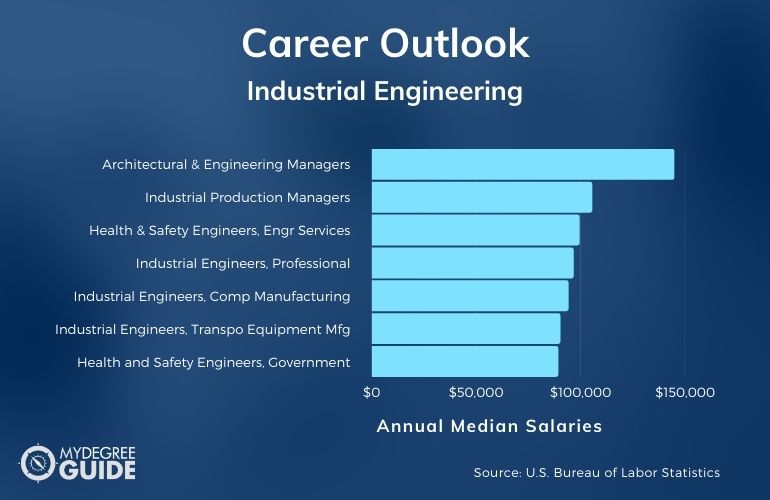If you’re interested in the specifics of how a business operates or how products get from one place to the next, then you may consider earning a master’s degree in industrial engineering online.

A graduate degree in industrial engineering can prepare you to help businesses create greater efficiencies, improve cash flow, and offer higher quality products or services to their customers.
Editorial Listing ShortCode:
The field of industrial engineering has a positive job outlook and career options with higher than average salaries. An industrial engineering master’s degree program can help put you on the path towards a rewarding career in this lucrative field.
Masters in Industrial Engineering Online Programs

Industrial engineering master’s degree programs typically offer courses from a blend of educational areas with a focus on engineering. Common areas of study include operational research, supply chain management, information systems, general engineering, engineering management, and data analytics.
When pursing a master’s degree in industrial engineering online, you often have the choice to complete your degree as a course-based, project-based, or thesis-based program. Your options can change depending on the school you choose to attend.
Most industrial engineering graduate programs also allow you to select a concentration or specialized area of study as part of your degree. Possible concentrations include healthcare management, regulated industries, systems engineering, operational research, logistics and transportation, leadership, and quality management.
Editorial Listing ShortCode:
The field of industrial engineering can offer a variety of opportunities and potential career trajectories, ranging from management and leadership positions in factories or warehouses to data or engineering-based roles.
Some graduates pursue careers as industrial engineers, logisticians, engineering managers, health and safety engineers, cost estimators, or chief engineering officers. Industrial engineers are responsible for evaluating processes and production systems in factories, warehouses, and businesses in general.
Industrial engineers may also recommend new ways of doing things. They can create efficiencies around product development, improve product quality, find cost savings in various processes, or improve processes between workers and machines.
Industrial Engineering Careers & Salaries

A master’s degree in industrial engineering can help qualify you for positions based in data, operations, advanced analytics, and engineering. You may also be better prepared to take on positions in management and leadership.
Industrial engineering professionals work in diverse environments, including warehouses, factories, health centers, and office buildings. Their work environments can be influenced by the industry they work for, such as transportation, manufacturing, professional services, research, or technical services.
According to the Bureau of Labor Statistics, the average salary for architecture and engineering occupations is $81,440 per year.
| Careers | Annual Median Salaries |
| Architectural and Engineering Managers | $144,830 |
| Industrial Production Managers | $105,480 |
| Health and Safety Engineers, Engineering Services | $99,410 |
| Industrial Engineers, Professional, Scientific, and Technical Services | $96,600 |
| Industrial Engineers, Computer and Electronic Product Manufacturing | $94,140 |
| Industrial Engineers, Transportation Equipment Manufacturing | $90,250 |
| Health and Safety Engineers, Government | $89,250 |
| Operations Research Analysts | $84,810 |
| Logisticians | $74,750 |
| Cost Estimators | $65,250 |
The Bureau of Labor Statistics predicts 3% job growth for the architecture and engineering field. There are also a number of careers related to industrial engineering that are expected to see growth over the next several years.
Editorial Listing ShortCode:
These growing positions include engineering managers (3%), logisticians (4%), health and safety engineers (4%), industrial engineers (10%), and operations research analysts (25%).
Industrial Engineering Master’s Curriculum

The curriculum for an industrial engineering master’s program can vary from school to school and can change depending on the concentration you choose to pursue. Common industrial engineering courses include:
- Engineering Probability and Statistics: This course looks at different topics of probability in relation to engineering, including discrete and continuous random variables, multivariate probability distributions, and hypothesis testing, among others.
- Topics in Engineering: You’ll explore various trending and emerging topics in the field of industrial engineering.
- Deterministic Operational Research: This course is a review of deterministic operations and design of solutions through theory and application models.
- Healthcare Systems: This course explores healthcare operations management’s use of various production systems engineering methods of modeling and analysis, including facility layout, capacity planning, and queuing models.
- Lean Concepts and Applications: This course is a review of key principles in lean thinking and conceptualization, focusing on how to use these methods in a real-world application setting.
- Supply Chain Engineering: This course is an in-depth look at supply chain management, taking into account various engineering principles, including design, analysis, and management.
- Simulation Analysis: This course explores various simulation models and related features, including queuing, design, validation, and output analysis.
- Statistical Quality Control: This course covers key principles of quality control, evaluation, and the use of results to make improvements in industrial engineering functions.
- Human Factors Engineering: You’ll review different factors of human engineering, including ergonomics, workstation design, and human-machine interface design.
- Reliability Analysis and Risk Assessment: This course is an overview of developing risk assessments and the advanced analytics of system reliability using various methods, including classical and median rank methodologies.
In addition to completing a variety of courses in the field of industrial engineering, you may be required to select a program type, such as course-based, project-based, or thesis-based. The option you select can impact the specific structure of your studies.
Admissions Requirements

In order to qualify for entry into a Master of Science in Industrial Engineering program, a number of admissions criteria need to be met. These requirements can vary from one school to the next, but they generally include:
- Bachelor’s degree in a related discipline, such as math, engineering, or science
- Letters of recommendation from academic advisors or employers
- Statement of intent detailing your academic background and your interest in the program
Other admissions criteria can include the completion of an online application and a copy of your resume. Some schools also request the submission of GRE or GMAT scores, but these scores are becoming a less common requirement.
Accreditation

Whether the program you’re interested in attending is regionally accredited is an important consideration. The designation of regional accreditation confirms the overall quality of education provided by the school and subsequent program.
In order to become accredited, institutions and their educational programming must meet predetermined quality standards. The accreditation status of the program you choose to attend can impact your ability to transfer credits, enroll in doctoral programs, or secure various employment opportunities.
Editorial Listing ShortCode:
You can find out whether the program you’re interested in attending is accredited by visiting the US Department of Education‘s website.
Financial Aid and Scholarships

There are a number of financial aid options available that can help you fund your graduate studies if you qualify. These options include federal and state aid offered in the form of grants and loans, scholarships from private and public organizations, and employer training programs.
If you are presently employed and pursuing your MS in Industrial Engineering, your employer might offer training or professional development programs to help cover the costs related to your studies, especially if your studies can benefit the organization.
You can find more information about financial aid opportunities and apply for aid via the Free Application for Federal Student Aid on the US Department of Education’s website.
Is Industrial Engineering Hard?

Working in the field of industrial engineering requires knowledge about various topics. These include supply chain management, transportation systems, quality control, warehousing strategies and design, and manufacturing processes.
An industrial engineering graduate program also covers statistics and probability. Skills in mathematics can be beneficial when it comes to evaluating existing processes and designing new ones. These skills can also be important when assessing product quality.
What Can You Do with a Masters in Industrial Engineering?
A master’s degree in industrial engineering can qualify you to pursue a number of careers in the field. Graduates tend to pursue careers as health and safety engineers, industrial engineers, quality engineers, operational research analysts, logisticians, or cost estimators.
With a graduate degree in the field accompanied with work experience, you may also be suited for positions in management and leadership. Common leadership positions include architectural and engineering managers, industrial production managers, and chief engineering officers.
How Long Does It Take to Get a Masters in Industrial Engineering Online?

While all programs are different, masters programs in industrial engineering generally require the completion of 30 credits which, when attending full-time, may take around 1 to 2 years to complete.
A number of factors can influence the length of time it takes for you to graduate, including the type of program you choose to attend. For example, some schools offer programs that are course-based, thesis-based, or project-based.
Other factors that can impact your timeline include whether you choose to attend on a part-time or full-time basis and if you are able to transfer previously earned credits into the program.
What Is the Difference Between Industrial Engineering vs. Mechanical Engineering?

Industrial engineering focuses on improving processes and service systems, including supply chains, healthcare, and transportation systems.
Mechanical engineering, on the other hand, is geared towards the design, development, and testing of physical machines and devices. Topics in the area of mechanical engineering include fluid dynamics, heat transfer, finite element methodology, automation and robotics, automotive engineering, energy systems, and nuclear energy.
Editorial Listing ShortCode:
Mechanical engineers can work on the design and development of air-conditioner units, vehicle engines, elevators, turbines, generators, and more.
What Is the Difference Between Industrial Engineering vs. Systems Engineering?

Systems engineering integrates areas of software and hardware engineering, computer science, and product development in order to design, develop, and resolve issues relating to complex technology-based systems.
This is in contrast to industrial engineering, which focuses on more abstract processes within a business. A systems engineering education often covers topics such as systems modeling and analysis, simulation, reliability based design, ergonomics, and systems safety.
Positions in the field include systems engineer, software engineer, systems data analyst, or systems manager.
What Is the Difference Between Industrial Engineering vs. Manufacturing Engineering?

Manufacturing engineering contributes to the design and improvement of physical products while also improving the actual manufacturing process itself. Professional manufacturing engineers can play a key role in research and development initiatives within an organization.
Relevant topics to the field of manufacturing engineering include computer integrated manufacturing technologies and production systems, statistical quality process controls, materials process selection, computational fluid dynamics, and design optimization.
Is a Masters in Industrial Engineering Worth It?

Yes, a masters in industrial engineering is worth it for many students. Earning a masters degree in this field can open up opportunities to work in a variety of industries, such as engineering services, manufacturing, healthcare, consulting, research, and academia.
Additionally, the Bureau of Labor Statistics predicts that a number of positions in the field of industrial engineering will experience job growth over the next decade. These positions include engineering managers (3%), logisticians (4%), health and safety engineers (4%), industrial engineers (10%), and operations research analysts (25%).
Universities Offering Online Masters in Industrial Engineering Degree Programs
Methodology: The following school list is in alphabetical order. To be included, a college or university must be regionally accredited and offer industrial engineering degree programs online or in a hybrid format.

Arizona State’s online Master of Science in Industrial Engineering program is one of the top 50 programs in the country according to U.S. News & World Report. It includes a total of 9 classes, which last 7.5 to 15 weeks. It requires a total of 30 credit hours.
ASU is accredited by the Higher Learning Commission of the North Central Association of Colleges and Schools.

Clemson University has an online master’s degree in Industrial Engineering program intended for professionals who are employed full time. Applicants must have at least 3 years of industry experience.
Courses are self-paced, lectures are downloadable, and there are no residency requirements. Coursework can be completed from anywhere with an internet connection.
Clemson University is accredited by the Southern Association of Colleges and Schools Commission on Colleges.

Columbia University offers an Industrial Master’s in Engineering – Systems Engineering program that is fully online. The program is a total of 30 credit hours, and applicants must submit GRE scores and official transcripts from an undergraduate program with a 3.0 GPA. This program is designed to teach students how to manage complex engineering projects.
Columbia is accredited by the Middle States Commission on Higher Education.

Georgia Tech’s online Master of Science in Industrial Engineering program is designed to allow students to learn on their own time from anywhere in the world. Coursework includes operational research, statistics, and applied industrial engineering.
Students study under faculty who are actively involved in conducting research and able to teach the latest developments.
The Georgia Institute of Technology is accredited by the Southern Association of Colleges and Schools Commission on Colleges.

Kansas State University offers online and on-campus graduate degree programs in industrial engineering. Applicants are expected to hold a B.S. in engineering, mathematics or a physical science and to be proficient in computer programming. Online students may need to make one trip to campus for an exam at the end of the program.
Kansas State University is accredited by the Higher Learning Commission of the North Central Association of Colleges and Schools.

At Louisiana Tech University, you can earn an M.S. in Engineering with a concentration in Industrial Engineering through their online masters in engineering program. Louisiana Tech’s academic calendar follows a quarter system, which means that a graduate student is considered full time when enrolled in 6 credit hours of coursework.
Louisiana Tech University is accredited by the Southern Association of Colleges and Schools Commission on Colleges.

Mississippi State’s distance education program includes a Master of Science in Industrial Engineering. The degree is available with both thesis and non-thesis options, depending on whether you are more interested in research or business and industry.
The curriculum includes the study of industrial systems, operations research, advanced analytics, manufacturing systems, management systems engineering, human factors, and ergonomics.
Mississippi State University is accredited by the Southern Association of Colleges and Schools Commission on Colleges.

New Mexico State University has an online Master of Science in Industrial Engineering program. The program is 30 credit hours and includes thesis and project options. Students can take up to 5 elective courses. All students must pass an exam upon finishing the program in order to graduate. Applicants should have a bachelor’s degree in engineering.
NMSU is accredited by the Higher Learning Commission of the North Central Association of Schools and Colleges.

At New York University, you can earn an M.S. in Industrial Engineering on campus. This degree program includes 18 elective credits so that you can study the subjects that best match your career interests.
Available elective courses include Engineering Economics, Work Design and Measurement, and Supply Chain Engineering. The entire program is 30 credits.
New York University is accredited by the Middle States Commission on Higher Education.

North Carolina State University offers a Master of Engineering with Industrial Engineering as a subplan area through its distance education program. This degree program does not require a thesis, final oral exam, or on-campus residency. It is 30 credit hours and is designed to be convenient and flexible.
North Carolina State University is accredited by the Southern Association of Colleges and Schools Commission on Colleges.

At Purdue University, you can earn an online Master of Industrial Engineering or an Interdisciplinary Master of Engineering with a concentration in Industrial Engineering. The online MSIE is a non-thesis program, but a thesis option is available on campus. The online MSE/MS is available with both thesis and non-thesis options.
Purdue University is accredited by the Higher Learning Commission of the North Central Association of Colleges and Schools.

Texas A&M University offers a Master of Engineering in Industrial Engineering both on campus and online. The degree is all-encompassing and does not include any tracks or specializations. It takes 30 credit hours to complete, and most students do not take more than 9 credit hours per semester.
Texas A&M University is accredited by the Southern Association of Colleges and Schools Commission on Colleges.

Earning an online Master of Science in Industrial Engineering from Texas Tech University can help prepare you for a career in industry, consulting, or university teaching and research. It is a 30 credit hour program that includes both thesis and non-thesis options. Non-thesis students must pass a final examination.
Texas Tech University is accredited by the Southern Association of Colleges and Schools Commission on Colleges.

The University of Alabama – Huntsville offers an MSE (Master of Science in Engineering) and an MSOR (Master of Science in Operations Research) in Industrial and Systems Engineering. Both programs are available in thesis and non-thesis options and take 30 credit hours of coursework to complete.
UAH is accredited by the Southern Association of Colleges and Schools Commission on Colleges.

A Master of Science in Industrial Engineering is available online from the University of Arizona. The program is designed to develop your skills in optimizing manufacturing operations and supervising production processes. The program includes options to complete a thesis, a hands-on project, or additional coursework.
The University of Arizona is accredited by the Higher Learning Commission.

The University of Central Florida offers a fully online MS in Industrial Engineering. The program is 30 credit hours long and includes education in operations research, human systems engineering and ergonomics, advanced analytics, and interactive simulation and training systems.
Other topics of study include quality systems engineering, simulation modeling and analysis, and systems engineering.
The University of Central Florida is accredited by the Southern Association of Colleges and Schools Commission on Colleges.

The University of Florida offers online and on-campus Master of Science and Master of Engineering in Industrial Engineering degree programs. The online graduate programs are designed to provide scheduling flexibility for working professionals.
Both the MS and the ME are available in thesis options. Students wishing to pursue the ME degree must have an undergraduate degree in engineering.
The University of Florida is accredited by the Southern Association of Colleges and Schools Commission on Colleges.

The University of Illinois-Urbana Champaign’s online Master of Science in Industrial Engineering program is a non-thesis program. It is designed for students who do not plan to pursue further education after completing the degree.
Course requirements are the same as for on-campus students. The program requires 32 credit hours of coursework and 4 credit hours of independent study.
The University of Illinois at Urbana-Champaign is accredited by the Higher Learning Commission.

The University of Southern California offers an MS in Industrial and Systems Engineering that is designed for professionals who aspire to leadership positions in their workplaces. The program is available both online and on campus, with both formats having the same course requirements and providing the same academic quality.
The University of Southern California is accredited by the Western Association of Schools and Colleges, the Senior College and University Commission.

Wright State University offers a Master of Science in Industrial and Human Factors Engineering online and on campus.
The degree is highly customizable and offers focus areas in Decision Analytics, Logistics and Supply Chain, Human Factors and Ergonomics, and Neuroengineering. You can also choose between a thesis and non-thesis option.
Wright State University is accredited by the Higher Learning Commission.
Getting Your Masters in Industrial Engineering Online

Masters in industrial engineering online graduate programs can allow you the opportunity to pursue high-paying positions in this lucrative, growing field, much like an online masters in engineering management or one in chemical or electrical engineering can.
Industrial engineering professionals can influence business processes relating to supply chain and transportation management, quality control, product development, and healthcare systems, among other areas.
Though you may be able to secure a good job with a bachelor’s in engineering online, a graduate degree may help prepare you to take on roles in management and leadership. You can also choose to pursue a career focused on data analytics and engineering.
If you’re interested in advancing in this rewarding field, you may consider exploring accredited online master’s degree in industrial engineering programs to find the one that best suits your professional goals.

